One of the paradoxes about a place like South Korea is its combination of great modernity with what your average Westerner has traditionally described as “Oriental inscrutability”, a term according to which people like the Japanese, the Koreans and especially the Chinese are considered to be comparatively uncommunicative, and indeed my own sojourns, first in Taiwan (with brief hops over to Hong Kong) and then in Korea, showed that in societies where communication was usually vertical, the more necessarily horizontal transmission of verbal information between peers is shockingly inefficient. An anglophone going to places like this experiences isolation, being surrounded by a wall of silence, and strange encounters, due to being an object of fascination and fantasy at the same time.
Korea’s relationships with both its direct geographical neighbours and countries farther abroad seem very ambivalent, but given the “isolationist” stance taken for so long (Korea was long known as the “Hermit Kingdom”), the “Confucianist” attitude imported from China long ago, plus the suffering inflicted not only by the latter but also marauding north Asian tribes in antiquity and of course the Japanese in more modern times, perhaps it is hardly surprising that an otherwise friendly and hospitable people should become rather taciturn, and possibly unco-operative, when confronted with strange, smelly foreigners for the first time, a reticence which is often misinterpreted. But this behaviour is exactly what you see anywhere, not just in Korea; the oldest find foreigners the hardest to handle, whereas the youngest find it easiest to adapt. It’s really no different in my own England.
Koreans are notorious among foreigners for styles of behaviour which are both ostensibly and factually rude. This is attributable primarily to the Korean historical experience, which has been horrendous. Korea has mainland China to the north and west and Japan to the east, and in ancient times had repeated invasions from marauding northern tribes (who, incidentally, also gave the Chinese quite a run for their money). That anything remotely and identifiably “Korean” should survive over the last 5,000 years is no small miracle. Their resilience allowed them to recover from Chinese domination, Japanese occupation and then their own uncivil war of global involvement (which has yet to be resolved, see below) and economic crises to produce a high-tech, high-income capitalistic state.
The innate stubbornness inherited from their forbears has proven to be an essential survival tool, but it also manifests itself as a great social and diplomatic hindrance. For example, being deeply inculcated with the concept of “face” and being also about ten times more “Confucian” than even the Chinese means that a resolution of the “Korean Problem” will remain difficult. To the southerners, the North Korean regime has always represented the worst aspects of Communism, despite the fact that their UN (read: US) “defenders” have themselves often committed atrocious violations against their human rights (example: Noh Gun Ri); on the other side, Kim Il-sung led the Communist North into a ruinous war, with the connivance of China, effectively against the rest of the world, a war which came to a grinding halt when the Armistice was signed and which, technically if not in fact, is really still in progress. Kim was able to present himself as the “Great Leader” who fought the American invader and won (but in the strange world of Communist lore, inconvenient truths are simply ignored). Neither side is willing to back away from its oppositional stance regarding the other for fear of “losing face”. Even the Chinese, who maintained NK as a convenient “buffer zone” against the naughty Yank for so long, have awoken suddenly to the presence of a nasty little nuclear state emerging on their own doorstep, the unthinkable sequelae of which might be the ultimate destruction of 5,000 years of China in about, oh, five minutes?
And here, perhaps, we see the most perverse twist in Korea’s tortured history. China fomented unrest across north- and south-east Asia for decades and left a trail of death and destruction which still haunts the area today. Vietnam, for example, remains a Communist country although it is trying, as the Chinese themselves are, to “modernise”, although one might expect eventual regime collapse as people become more affluent and restive. As China now becomes both a major economic producer and consumer, it will find that it is its economic advantage which will create or destroy a peaceful status quo in East Asia. China could not continue to be a Communist state, and under Chairman Deng Xiaoping, the slow process of modernisation began.
North Korea is now increasingly isolated, surrounded by wealthy and powerful neighbours, and unable to depend for assistance on former Communist allies, who (apart from China, and perhaps Vietnam and Cuba) have essentially disappeared. During the Cold War it was able to tap the likes of the Soviet Union for things like fuel, but since the fall of the Berlin Wall and the collapse of the Soviet empire, even China felt the chill winds of change and realised that it was inevitable. For North Korea, those winds are blowing very chilly indeed.
During many conversations over the last couple of years with the new generation of well-educated, young modern South Koreans, consciousness of what they term the “historical imperative” of reunification is evident, but the practical obstacles are an order of magnitude greater than they were in the only similar case, which was the reunification of Germany. Chancellor Willy Brandt’s policy of “Ostpolitik” led to the Fat Hen pouring large piles of Deutschmarks into the East, with the result that when the Wall was torn down, it was in fact the most affluent of the Eastern European economies. Although problems remain in East Germany, the lesson for South Korea is that reunification will involve massive amounts of everything, especially money. With an essentially collapsed economy, poor agriculture, power shortages and long-term mass malnutrition, NK looks bad and may well go out with a bang. The South will be the primary donor, and it will be bled dry.
Perhaps the Chinese have started to realise that their idea of having a like-minded ally state to buffer them from the naughty Americans was wrong all along; after all, the American presence on the peninsula is basically in response to the North – remove the North, establish friendly relations with the new unified government, and with the new stability the need for US personnel, at least in Korea, would evaporate. Of course, the Chinese are not stupid and I am sure that they can see this, too. Even the South Koreans would be happy to wave goodbye to the naughty Yanks forever. Instead, and for the foreseeable future, they have a former ally who is a parasite with a dynastic ruling system, something not tolerated in other Communist countries, who in most cases liberated themselves from precisely such rulers by force.
Anyway, the point of this article is that if the Koreans seem to the visitor to be less than forthcoming on a number of issues, perhaps it is not nearly surprising. Having been in a succession of historical situations in which their only real options may have been either to fall back on their traditional loyalties or face annihilation, they chose loyalty, and that is why they are still here. Their continual loyalty to one another has bred a kind of heightened insularity of attitude, which they find tough to break out of – after all, it’s kept them going for five thousand years, so if it ain’t broke, don’t fix it. The "in-group" is the most important entity of Korean society and Koreans network fanatically, for they depend upon their contacts in times of adversity, such as the loss of their job or a generally bad economic situation.
The visitor, then, in East Asia generally but in Korea in particular, needs to exercise continuous forbearance. The Koreans still need time to understand, for example, that not all white-skinned “weigugin” are actually Americans – they may be Russians, French, Italians, even English teachers from England. You meet them all here in Changwon! ^_^
It is the battering of the cruel centuries which creates the walls behind which peoples such as the Koreans feel most secure, which exist in their minds and are therefore so much harder to tear down, and these will only crumble at last when they feel as secure on the outside as they do on the inside. Perhaps this is something that the current US administration in particular must realise.
Sunday, October 09, 2005
Saturday, September 24, 2005
Pictures
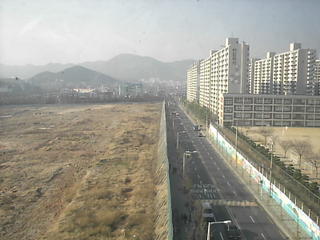 OK, now let's see what this place is like. I live in a planned industrial city called Changwon, which is close to the southern coastal port of Masan and about forty-five minutes' bus ride from the famous port of Pusan. This first picture shows a view from my workplace about six months ago; the bare ground on the left is now occupied by an extensive building site. On the right is the local elementary school, and in fact many of my youngest children come to classes on Tuesdays, Thursdays and Fridays from here, conveniently just across the road.
OK, now let's see what this place is like. I live in a planned industrial city called Changwon, which is close to the southern coastal port of Masan and about forty-five minutes' bus ride from the famous port of Pusan. This first picture shows a view from my workplace about six months ago; the bare ground on the left is now occupied by an extensive building site. On the right is the local elementary school, and in fact many of my youngest children come to classes on Tuesdays, Thursdays and Fridays from here, conveniently just across the road.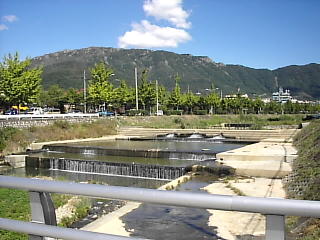 Changwon seems to have plenty of minor waterways, and in fact Korea has the distinction of being the most heavily afforested country on Earth (we are told), hence there never seem to be any water shortages. Being surrounded by hills, the city is always scenic and if you go to places like nearby Masan or Pusan it is much the same, although in the latter case the city occupies a much larger plain.
Changwon seems to have plenty of minor waterways, and in fact Korea has the distinction of being the most heavily afforested country on Earth (we are told), hence there never seem to be any water shortages. Being surrounded by hills, the city is always scenic and if you go to places like nearby Masan or Pusan it is much the same, although in the latter case the city occupies a much larger plain.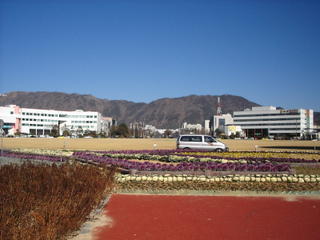 Here we can see the hills behind the local government offices, looking due north from the big road circle junction at the centre of the town. Behind me as I was standing there on a hot summer's afternoon was the E-Mart (on the left) and the Lotte shopping/cinema complex (right). South of here is the Sangnam-dong shopping area.
Here we can see the hills behind the local government offices, looking due north from the big road circle junction at the centre of the town. Behind me as I was standing there on a hot summer's afternoon was the E-Mart (on the left) and the Lotte shopping/cinema complex (right). South of here is the Sangnam-dong shopping area.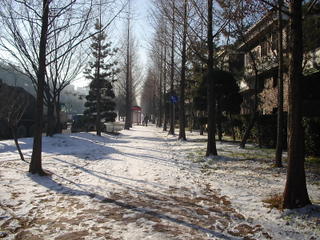 Korea also has very cold winters and although there is a dusting of snow here, it is comparatively rare in the extreme south; in the winter of 2003 we only had a very light sprinkling of snow on a weekday afternoon, which did not last very long. Here we see some snow from the winter of 2004, which lasted a surprisingly long time although it was never very deep. In fact, the footpaths also often degrade badly as a result of heavy rains, and have to be repaired on a regular basis throughout the year.
Korea also has very cold winters and although there is a dusting of snow here, it is comparatively rare in the extreme south; in the winter of 2003 we only had a very light sprinkling of snow on a weekday afternoon, which did not last very long. Here we see some snow from the winter of 2004, which lasted a surprisingly long time although it was never very deep. In fact, the footpaths also often degrade badly as a result of heavy rains, and have to be repaired on a regular basis throughout the year.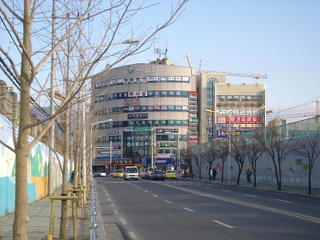 Finally, here's the place where I actually work five days a week. It is one of a nationwide franchise chain, and from reports freely available on the Internet, some branches are not as good as the ones I have worked for by a long chalk. This is an unfortunate characteristic of all English teaching franchises wherever you go - they are really only as good as the calibre of the owner, which varies on an individual basis. The picture at the top of the page was taken before construction work started; the elementary school is on the left and the developer's safety wall is on the right.
Finally, here's the place where I actually work five days a week. It is one of a nationwide franchise chain, and from reports freely available on the Internet, some branches are not as good as the ones I have worked for by a long chalk. This is an unfortunate characteristic of all English teaching franchises wherever you go - they are really only as good as the calibre of the owner, which varies on an individual basis. The picture at the top of the page was taken before construction work started; the elementary school is on the left and the developer's safety wall is on the right.For anyone considering going to Korea to teach, this matter of manager calibre is a major issue. Communication in English is something managers are often very poor at, as their main raison d'etre is making money; and a very good student will probably speak better English than either their Korean teachers or the manager. But this is just a fact of life.
Friday, September 23, 2005
First Things First . . .
Let's be brutally honest about this: I didn't have to leave England. I could have got myself another silly laboratory job, kept the car and (presumably) eventually have found myself a nice house to settle into. But no. I wanted a severe change, and I certainly got it . . .
Truth to tell, we are really talking about "leaving Wales" rather than England, as I had been living and working in South Glamorgan from mid-1998 onwards after a Major Falling Out with my then boss in the city of Leicester in the English midlands. I had been the chemist at a well-known electroplating and anodising factory there for some fifteen months when my boss threatened (in front of several astonished witnesses, let it be said) to cut my throat. The reason being that he wanted to keep the undercoat on the roof (which was soon to become a second work floor) clean prior to applying the topcoat. Unfortunately, our chemical store could only be reached via this route, and so the conclusion was inevitable.
Looking back, I should have taken the man to court and screwed him for every penny that he had. But instead, I stormed up to the Manager, Neil (baldy guy) and told him what was going to happen. Result: about a month later, this same company employed a recent chemistry graduate from Leicester University (who had been ekeing out a meagre living since graduation, six months earlier, working in a local women's clothes shop for a manager she also despised) for nearly four thousand quid a year less than I was getting.
So I returned to my habit of bumming around looking for a new job (always good for mental maturation, I find), and after five months a telephone call was recorded while I was out: a man called Jim (who turned out to be the Commanding Officer of an RAF Squadron in Wales) was looking for an electroplating/anodising chemist and I was the only one on the recruiter's records. Would I be interested? Well, I spoke with the man and eventually made my way back to Cardiff (where I had lived for three years as a biology student back in 1985-88), and stayed there for nearly four years. Why did I leave? They kept closing down the places on the camp where I was working. Eventually there would have been no job at all. So I did the strategically sensible thing and hopped it.
Now, I had seen the TV series "Shogun" Way Back When on BBC TV, starring well-known Hollywood Bloke Richard Chamberlain, and had acquired thereby a fascination with Japan; I had tried to get a job with the JET Programme back in '92 but alas, even then, I was already too old (a common problem with many people like myself), but from about 1999 onwards, armed with my cable account in Cardiff, I began contacting people in Japan and eventually secured an interview with a certain English teaching company in Shibuya. Alas, however, that eventually fizzled, and I had already accepted voluntary termination from the RAF job when I received an e-mail telling me not to return to Japan. That was not a pleasant Christmas (as the job ended formally on December 31st 2001) but it did commit me to change and getting out of benighted Blighty.
First I went to Taiwan and taught English to little children there; then after ten awkward months being shuttled around between jobs, I finally lost my temper and contacted a man I knew in Masan about a possible job in South Korea. The job offer came back in just three days (and all of this was conducted over MSN Messenger in a local cyber cafe, believe it or not!), and about a fortnight later I was on a cheap flight to Jeju Island, and thereafter to Pusan.
Now I have started my third year working for the same boss here, having shifted location once, but still living in the same place, although after the pointless financial debacle of Taiwan, things are much better money-wise as well and I have started to get around a bit more and go to the pub etc. At the start of the second year, I built a new PC and got a cable connection; nowadays I can call people all over the world using Skype and so my once-hideously expensive calls home have tumbled in cost. Things are not perfect but, as they used to say when I was a biology student in Cambridge (after finishing the course in Cardiff): "It's better than a slap in the face with a shovel." And of course, I get the opportunity to see places and get paid, so I can hardly call it "bad".
But from a Westerner's point of view - and by this I mean "from a Western European's POV" - what you encounter in East Asia can be very disconcerting - an alien culture with a language very different from your own (and which you may have trouble learning) but on the other hand, this can be very liberating, in the sense that because you are not part of the society yourself, you are insulated somewhat from having to behave as the locals would. Yet, it is a great opportunity to learn not only about the place and culture, but also about how the local people think and feel about things, and often this is no different from how you yourself feel and think; it simply expresses itself in a different way. The recent deaths of two elderly relatives back in England made me think that when such opportunities come, and they may only come once in your lifetime, they must be seized and exploited. We waste too much of our lives on trivia and stupidity.
So when I look back upon what I am doing now, at some time in the future, I can be sure that it was not a waste: I spent years of my life in distant lands, learning things which you can only learn first-hand, in a place where I had made my own decision to stay and live. Finally, I was fully independent and controlling my life, to some extent better than I ever had at home, and that cherished independence was what I had always wanted.
Thank you, Korea.
Truth to tell, we are really talking about "leaving Wales" rather than England, as I had been living and working in South Glamorgan from mid-1998 onwards after a Major Falling Out with my then boss in the city of Leicester in the English midlands. I had been the chemist at a well-known electroplating and anodising factory there for some fifteen months when my boss threatened (in front of several astonished witnesses, let it be said) to cut my throat. The reason being that he wanted to keep the undercoat on the roof (which was soon to become a second work floor) clean prior to applying the topcoat. Unfortunately, our chemical store could only be reached via this route, and so the conclusion was inevitable.
Looking back, I should have taken the man to court and screwed him for every penny that he had. But instead, I stormed up to the Manager, Neil (baldy guy) and told him what was going to happen. Result: about a month later, this same company employed a recent chemistry graduate from Leicester University (who had been ekeing out a meagre living since graduation, six months earlier, working in a local women's clothes shop for a manager she also despised) for nearly four thousand quid a year less than I was getting.
So I returned to my habit of bumming around looking for a new job (always good for mental maturation, I find), and after five months a telephone call was recorded while I was out: a man called Jim (who turned out to be the Commanding Officer of an RAF Squadron in Wales) was looking for an electroplating/anodising chemist and I was the only one on the recruiter's records. Would I be interested? Well, I spoke with the man and eventually made my way back to Cardiff (where I had lived for three years as a biology student back in 1985-88), and stayed there for nearly four years. Why did I leave? They kept closing down the places on the camp where I was working. Eventually there would have been no job at all. So I did the strategically sensible thing and hopped it.
Now, I had seen the TV series "Shogun" Way Back When on BBC TV, starring well-known Hollywood Bloke Richard Chamberlain, and had acquired thereby a fascination with Japan; I had tried to get a job with the JET Programme back in '92 but alas, even then, I was already too old (a common problem with many people like myself), but from about 1999 onwards, armed with my cable account in Cardiff, I began contacting people in Japan and eventually secured an interview with a certain English teaching company in Shibuya. Alas, however, that eventually fizzled, and I had already accepted voluntary termination from the RAF job when I received an e-mail telling me not to return to Japan. That was not a pleasant Christmas (as the job ended formally on December 31st 2001) but it did commit me to change and getting out of benighted Blighty.
First I went to Taiwan and taught English to little children there; then after ten awkward months being shuttled around between jobs, I finally lost my temper and contacted a man I knew in Masan about a possible job in South Korea. The job offer came back in just three days (and all of this was conducted over MSN Messenger in a local cyber cafe, believe it or not!), and about a fortnight later I was on a cheap flight to Jeju Island, and thereafter to Pusan.
Now I have started my third year working for the same boss here, having shifted location once, but still living in the same place, although after the pointless financial debacle of Taiwan, things are much better money-wise as well and I have started to get around a bit more and go to the pub etc. At the start of the second year, I built a new PC and got a cable connection; nowadays I can call people all over the world using Skype and so my once-hideously expensive calls home have tumbled in cost. Things are not perfect but, as they used to say when I was a biology student in Cambridge (after finishing the course in Cardiff): "It's better than a slap in the face with a shovel." And of course, I get the opportunity to see places and get paid, so I can hardly call it "bad".
But from a Westerner's point of view - and by this I mean "from a Western European's POV" - what you encounter in East Asia can be very disconcerting - an alien culture with a language very different from your own (and which you may have trouble learning) but on the other hand, this can be very liberating, in the sense that because you are not part of the society yourself, you are insulated somewhat from having to behave as the locals would. Yet, it is a great opportunity to learn not only about the place and culture, but also about how the local people think and feel about things, and often this is no different from how you yourself feel and think; it simply expresses itself in a different way. The recent deaths of two elderly relatives back in England made me think that when such opportunities come, and they may only come once in your lifetime, they must be seized and exploited. We waste too much of our lives on trivia and stupidity.
So when I look back upon what I am doing now, at some time in the future, I can be sure that it was not a waste: I spent years of my life in distant lands, learning things which you can only learn first-hand, in a place where I had made my own decision to stay and live. Finally, I was fully independent and controlling my life, to some extent better than I ever had at home, and that cherished independence was what I had always wanted.
Thank you, Korea.
Subscribe to:
Posts (Atom)


